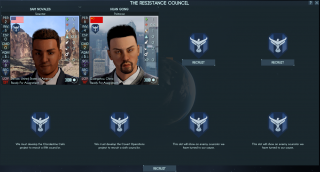Councilors: Difference between revisions
Tetragramm (talk | contribs) m (→Traits) |
No edit summary |
||
| Line 1: | Line 1: | ||
[[File:Council.png|thumb|320px|Council view]] | |||
Councilors are a faction's primary proxies on Earth and may also go to space to advance its interests there. Factions may initially have four councilors but certain projects allow them to expand the size of their council to six. Their primary role is to perform Missions on behalf of their faction. | |||
Periodically, the game will enter the assignment phase, during which all factions will assign their councilors to missions. These missions will be resolved in a random sequence over the next few weeks. While some missions are automatically successful, most require a success roll. Missions can target nations, control points, habitats, and other councilors. | |||
Factions can recruit councilors by spending Influence. Each month there is a new group of potetial recruits to choose from. You can also turn councilors from other factions to work for you. | |||
Revision as of 19:08, 3 October 2022
Councilors are a faction's primary proxies on Earth and may also go to space to advance its interests there. Factions may initially have four councilors but certain projects allow them to expand the size of their council to six. Their primary role is to perform Missions on behalf of their faction.
Periodically, the game will enter the assignment phase, during which all factions will assign their councilors to missions. These missions will be resolved in a random sequence over the next few weeks. While some missions are automatically successful, most require a success roll. Missions can target nations, control points, habitats, and other councilors.
Factions can recruit councilors by spending Influence. Each month there is a new group of potetial recruits to choose from. You can also turn councilors from other factions to work for you.
Primary Role of Councilors
Their primary role is to perform Missions on behalf of your faction. Periodically, the game will enter the mission phase, during which all factions will assign their councilors to missions. These missions will be resolved in a sequence over the next few weeks. While some missions are automatically successful, most are contested and require a success roll. Missions can target nations, Control Points, space facilities, and other councilors.
You recruit councilors to your faction by spending Influence. You’ll have a group of possible recruits to choose from each month. You can also turn councilors from other factions to work for you.
Councilor Characteristics and Stats
Councilors have Professions, Attributes, Traits, Incomes and Orgs.
Professions
Professions are akin to a character class in RPGs and other games, though in Terra Invicta they are geared toward navigating the modern global political and economic environment. The councilor’s profession determines the range of councilor Attribute scores, what Missions the councilor can do, and what range of Traits the councilor may have.
Attributes
Many of councilors' Attributes determine how good they are at Missions. The eight Attributes councilors have are:
- Persuasion
- Investigation
- Espionage
- Command
- Administration
- Science
- Security
- Loyalty
The first four are typically used in Missions – Control Nation, for example, uses Persuasion, while Assassinate Councilor uses Espionage and Assault Alien Asset uses Command.
Persuasion, Command, Administration and Science grant bonuses to your councilor’s influence, ops, money, and research incomes.
Administration also sets how many Orgs you can control. Security and Loyalty are defensive stats.
Traits
Traits are characteristics of the councilor that provide conditional bonuses to Missions, Incomes, and occasionally penalties and restrictions to the councilor’s Missions and movements. The Demagogue trait, for example, grants an Influence Income, plus bonus persuasion in nations with low education, but penalizes persuasion in high-education nations.
Orgs
Organizations, or Orgs, are essentially your councilors’ gear. These are government agencies, NGOs, criminal organizations, and private companies under a given councilor’s control. These are acquired with money, influence and rarely ops (typically for criminal cartels). They provide stat bonuses, incomes, missions, bonuses to research, and bonuses to certain priorities for nations under your control. The U.S. Air Force Research Laboratory, for example, grants a bonus to faction research, a bonus to the science stat for the individual councilor, and helps your nations develop their military and spaceflight programs more quickly.
Orgs can be transferred between councilors and sometimes stolen by other factions via the Hostile Takeover mission.
Councilors gain experience from successful missions, which can be spent on improving the councilor by improving their attributes, adding missions, or adding or removing certain traits.
Go back to Main Page.
 Hooded Horse Wikis
Hooded Horse Wikis
